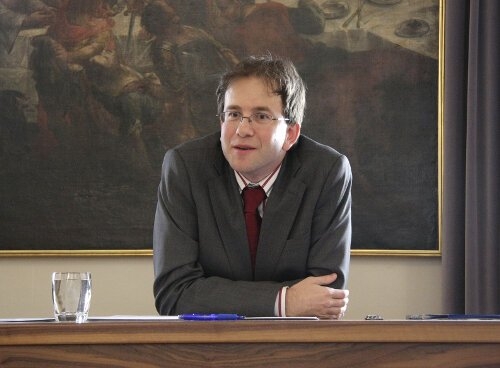By: Nina Žoher / Nova24tv
At the administrative session, the Constitutional Court elected Matej Accetto the next president of the Constitutional Court. He will take office on December 19th, the Constitutional Court said. At a time when criticisms of the Constitutional Court of the Republic of Slovenia are more severe and serious than ever – the institution has found itself in crisis and at the lowest point of trust of both the lay and professional public – the Constitutional Judge Klemen Jaklič, judging by a letter addressed to all constitutional judges, decided to “obstruct” today’s vote. “Today, the current majority will vote for a new president, their pre-agreed candidate Dr Matej Accetto, who, since his election as a judge, has always and without exception pushed the institution in the direction that is the subject of the above-mentioned criticisms and did not pay attention to these criticisms,” he is critical. He added the belief that such leadership will deepen the already broken public confidence in the institution and its independence.
The direction to which most of this composition has led the institution of the Constitutional Court of the Republic of Slovenia since its appointment has been the subject of serious criticism from both the professional and lay public for a long time. The fact is that the criticisms are worse and more serious than ever, and the institution has found itself in a crisis, at the lowest point of public confidence (both lay and professional) since the founding of the state.
According to Jaklič, the core of the criticism is that most of this composition has moved away from both established methods and established substantive doctrines of the decision-making of the Constitutional Courts in a free democratic society. “Even to the extent that in matters, especially those that would have significant consequences in the political arena, it decides ‘politically based on results,’ on the basis of ‘argumentatively empty paragraphs,’ ‘offensive to common sense’ or inconsistently with argumentative logic, ‘activist on the wrong grounds’ etc., which has supposedly lead the institution to the point where it represents an example of institutional ‘abuse of law’ for political purposes (Prof. Dr Jambrek).”
The Constitutional Court needs constitutionally trained structures
Jaklič further reminded that this public criticism was expressed by too many leading names of specialists in the field of constitutional jurisprudence held by the Slovenian state to date, including the first President of the Constitutional Court of the Republic of Slovenia, former constitutional judges, former judges of the European Court of Human Rights, representatives of the academic profession in this field, etc. “In my opinion, these criticisms, primarily professional, and consequently also from the lay public, are substantially justified in terms of content, which I try to point out in regular separate opinions in my best understanding of the constitutional field and its methods. Since most of this composition has no ear for criticism of the profession, despite its seriousness, I estimate that it will contribute to the future development of Slovene constitutionalism mainly in terms of a negative example of a renewed orientation, which will be picked up, hopefully, by more future constitutionally trained and only constitutionally unwaveringly bound future constitutions,” he pointed out.
Jaklič swore that he would act according to his conscience, so he did not take part in the voting
According to Jaklič, the current majority will vote for their pre-agreed candidate, Dr Accetta, who, since his election as a judge, has always and without exception pushed the institution in the direction that is the subject of these criticisms and does not pay attention to these criticisms. “Such leadership will further deepen the public’s trust in the institution and its independence. The majority undoubtedly has every right, even if only formally, to do so and to take an additional measure of responsibility for their decisions, despite the situation. However, they cannot count on my participation in legitimising such additional burdens.” Jaklič emphasises that when he was elected to the National Assembly, he swore that he would act according to his conscience, which tells him that in the described circumstances he cannot vote in the majority on their new leadership.
The Constitutional Court announced that Matej Accetto was elected the next president of the Constitutional Court at today’s administrative session. He will take office on December 19th.

